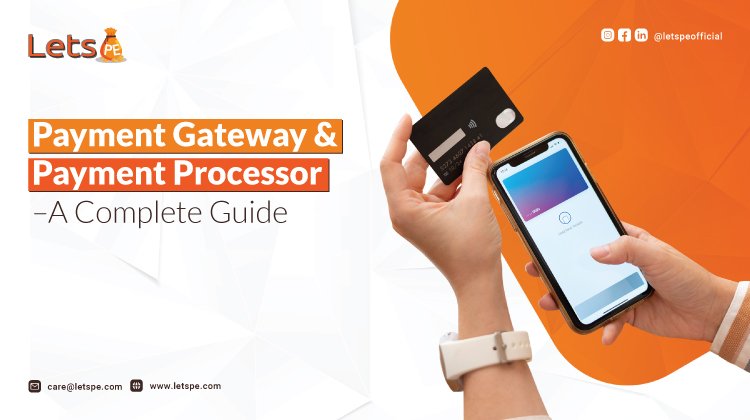Payment Gateway & Payment Processor – A Complete Guide
A payment processor is a business that enables interaction between the financial institution (Bank) that authorized the consumer's debit or credit card and the bank of the seller.

Online money transfers and the role of E-commerce is increasing on a daily basis. Connect with LetsPe, the top Payment Gateway company, and simply organize your online payment transaction. These payments are supported by a number of mediators or organizations that act as a link between purchasers and sellers of items and services (merchants) in the online world.
These mediators or organizations are as follows:
- Banks
- Payment Gateway Solutions
- Merchant Payment Options
- Instruments Aggregators Who Are Not Banks
- Technology service providers that support Payment Gateway Operations.
- Marketplaces for E-Commerce
Who is a part of the Payment Gateway Process?
The need for this process arose with this increase in E-commerce businesses and online fund transactions as it helps to manage online payments. Before proceeding, we must disclose who is involved in its procedure.
Customer - Owns the card and entered its information on the Payment page
Customer's Bank (Issuing Bank) - Issued the customer's card
Merchant – The person or company whose website the customer is purchasing a product or service from.
Merchant's Bank (Acquiring Bank) - The location of the payment
Card Network - For Example - Visa, Mastercard
Payment Gateway - Software that ensures the security of money transactions.
Complete Payment Gateway Process

The complete payment gateway process is given below:
Customer Selects the Product, Clicks on Paybutton, Fill Card Details
Payment Gateway encrypts data securely and takes it to Merchant’s Bank.
The Bank confirms the Balance and Validity of the card
Bank Sends request to the Card Network. Card network forwards the request to the customer’s bank in order to confirm if the payment should be processed or not. Feedback comes to the card network from the customer's bank. Card Network forwards the feedback to Merchant’s bank. Merchant’s Bank informs Payment Gateway about the payment, if it is successful or not.
Two Scenarios:
Payment Successful: Payment Gateway informs the merchant and the product/service is processed ahead.
Payment Unsuccessful: Gives notification of payment fails
Gives option to select any other payment option This entire process takes only 3-4 seconds to complete. apply for quick payment gateway onboarding online in just few hours.
Payment Gateway
A Software-Application which works on Payment Data (Ex-Credit Card Details), leads it to the Merchant’s bank and later brings back the feedback report. A payment gateway is a merchant service offered by an e-commerce application service provider that allows e-businesses to accept credit cards & manage online payments.
- Roles played by Payment Gateway in this process:
- Confirms the Balance and Validity of the Card.
- Share Card details in an Encrypted format (Highly Secure).
Payment Processor
A payment processor is a business that enables interaction between the financial institution (Bank) that authorized the consumer's debit or credit card and the bank of the seller. It is the processor's responsibility to confirm and authorize payment.
Types of Payment Processor
They are often classified as either Front-End or Back-End.
Front-end processors have links to numerous card associations and provide merchant banks with authorization and settlement services.
Back-end processors take settlements from front-end processors (For example, transfer funds from the issuing bank to the merchant bank via the Federal Reserve Bank).
Payment Processor Role
It Manages the credit card transaction process, acting as a kind of mediator between the bank and the merchant. It simply communicates information from your customer's card to your bank and the customer's bank.
What exactly are payment processing abilities?
The most prevalent key abilities needed by companies providing payment processors are documentation, vendor management, customer service, invoicing, deposits, technical, and scanning.
Payment Gateway & Payment Processor
These are two different services of a single payment process. Some Companies, like LetsPe (& Stripe), provide both of these services and others either opt for Payment Gateway or Payment Processor.
Difference Between Payment Gateway & Payment Processor

Payment Gateway either approves or declines the funds transaction. A Payment Gateway Service confirms that the transaction of the payment is not fraud. The need for this service started when an E-commerce firm opened in 1992 & online fund transactions were required. Payment Processor’s job is to process or take a payment that moves from the Payee’s account to the merchant’s account. They ensure that the card networks get their fees from the merchants.
Payment Gateway & Payment Processor Work
When a buyer moves to payment, they enter the card details. The payment gateway encrypts the customer's information before sending it to the issuing bank. The data is decoded and converted into a format that the issuing bank may use to authenticate the customer's information. Once the information has been confirmed, the payment processor transmits it using safe encryption. Secure Socket Layer (SSL) encryption is the most widely utilized.
Is it necessary to use both a payment gateway and a payment processor?
Most individuals wonder if a payment gateway and a payment processor are essential for businesses. Only a payment processor is necessary for offline transactions because credit card terminals operate as a payment gateway. They use EMV chips to authenticate the card, whereas the payment processor handles the back end of the transaction. However, for online payment transactions, both a payment gateway and a payment processor are necessary. Payment Gateway validates the information without the usage of EMV chips. In this case, the payment processor is in charge of the transaction's backend.
Modern Payment Gateway

Aside from e-commerce transactions, modern payment gateways can manage payment processing across a wide range of channels and devices. It can eliminate the need to manually gather payment and sales data when coupled with third-party CRM and ERP applications.
How can a payment gateway benefit Businesses?

Everything, from keying in cards to swiping or processing checks, may be done on a desktop or laptop using a payment gateway. It also provides billing and reporting capabilities. Additionally, recurring billing enables you to save your customers' information and charge them on a frequent basis.
Conclusion
In this above article, we have tried to cover all the aspects related to Payment Gateway and Payment Processor. If you find the information clear, do leave your valuable comment below. You have this option to bookmark this site to get more knowledge about Best Payment Gateway India for Online Payments in future.












